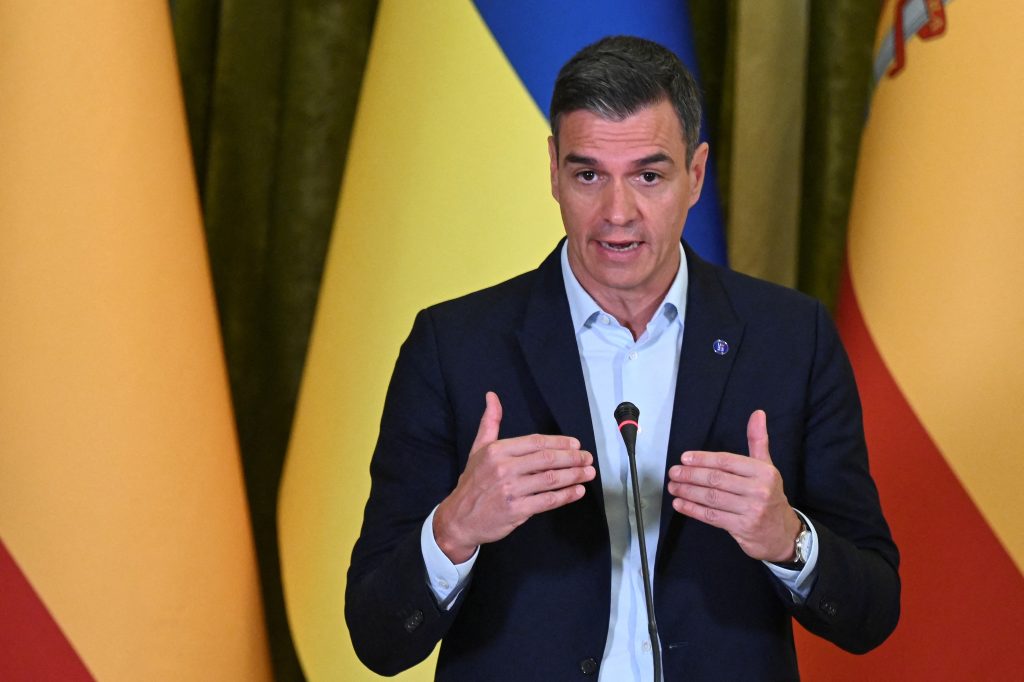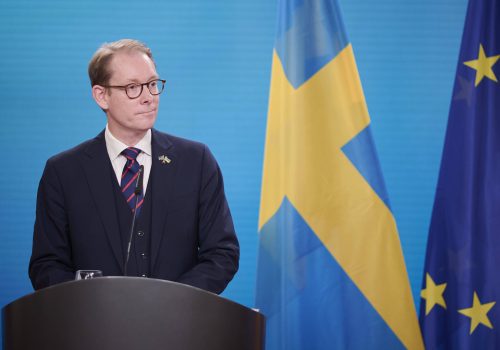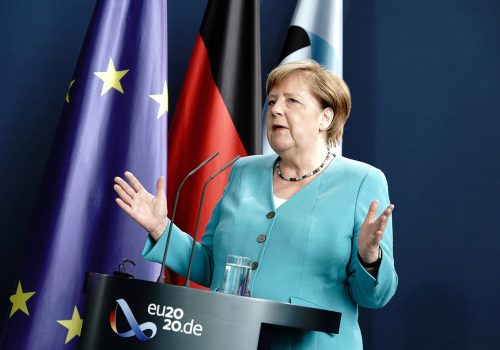Spain took over the rotating presidency of the Council of the European Union (EU) on July 1, just three weeks ahead of its own snap general elections. As the holder of the presidency, Spain is responsible for driving forward the meetings and decisions of the Council, comprised of combinations of ministers from the twenty-seven member states by portfolio, and will host a number of EU summits. Importantly, these duties come with greater influence to set the EU legislative agenda. As an “honest broker,” Spain has a special responsibility to facilitate compromises among member states and help finalize major pieces of legislation at a critical moment ahead of elections taking place next year.
The Spanish presidency is the first of the new trio comprised also of Belgium and Hungary. Whereas the previous trio was defined by Russia’s full-scale invasion of Ukraine, this new trio will potentially need to reshuffle its priorities for the EU and transatlantic relationship, following not only the parliamentary elections in June 2024 and the formation of the next European Commission, but also the US elections shortly after. Each new presidency trio sets long-term goals for its collective eighteen-month term and the priorities of each individual presidency generally reflect the broad ambitions of the trio (although Hungary may be blocked from chairing the Council given ongoing concerns about the government’s lack of alignment with EU values).
Spain takes up the mantle from Sweden, whose presidency prioritized security, European unity, competitiveness, the green transition, democratic values, and the rule of law. Sweden made a dent in these goals, and Spain is inheriting over three hundred pieces of unfinished legislation, of which it has identified more than 120 as priorities. Spain’s thematic priorities for its own presidency show continuation on some themes (the green transition and European unity) as well as more novel focuses (reindustrialization and social justice).
In a speech on June 15, Spanish Prime Minister Pedro Sánchez outlined a number of priorities for Spain’s EU presidency. It is worth taking a closer look at four of these priorities to assess the chances of moving each issue forward, as well as one additional wildcard he did not mention.
1. European reindustrialization
Sánchez’s agenda includes a new emphasis on economic security and beefing up European industrial strategy, including in the health and agriculture sectors. Spain will pay special attention to ensuring thriving strategic industries in Europe with greater innovation capacity, combined with an openness to deepen external partnerships.
In that vein, the commitment to openness will likely include a push to deepen ties between the EU and Latin America, potentially as soon as the EU-Community of Latin American and Caribbean States summit on July 17-18. Spain might also prioritize getting the long-negotiated EU-Mercosur free trade agreement with Latin America over the finish line, although divergences over environmental rules might take longer to overcome than Spain would like.
Regarding its intention to ensure economic security within the bloc, Spain will likely take advantage of its presidency to advance the conversation on economic governance. Especially on the future of fiscal rules, EU member states need to reach consensus on the re-imagination of the Stability and Growth pact (the agreement that sets limits of 60 percent of gross domestic product for debt and 3 percent for annual deficits), which has been suspended since the COVID-19 pandemic. The success of the Spanish presidency may well be judged on this contentious issue. In an increasingly fragmented global economy, Europe is facing growing challenges to maintain its competitiveness. These include the effects of the Russian war in Ukraine and the US Inflation Reduction Act, which has drawn criticism as protectionist. Here Spain must facilitate conversations within the EU that build on recent Commission proposals for EU competitiveness beyond 2030.
Although Europe hasn’t produced big tech champions on artificial intelligence (AI), it is leading the world in proactive regulation—a phenomenon called the “Brussels Effect,” in which the EU’s size and active approach toward regulation encourages foreign-based companies to comply with EU standards. In that regard, one of the most likely accomplishments of the Spanish presidency will be finalizing the AI Act, which Sánchez identified as a key priority—unsurprisingly, given Spain’s own leadership in the AI market. Although there is widespread support to get the AI Act passed, there is still a major sticking point between the Parliament and the Commission on banning facial recognition software.
2. The green transition
Driving the green transition has been a long-time focus of the current Spanish government. Heading into the Spanish presidency, pushing environmental legislation around the EU’s “Fit for 55” ambitions is one of Spain’s top priorities.
In particular, following the European Parliament’s vote in May on legislation to reduce methane emissions, the Spanish presidency will preside over the conversations between the Council and the Parliament on the final text of this legislation. Another green transition priority will be building on the progress that took place under Sweden’s presidency on proposals to define the regulatory framework for a future natural gas and hydrogen market. Trilogues—talks among the Parliament, the Council, and the Commission—have begun on the issue, but one of the main hurdles remains identifying, or “unbundling,” gas providers from the owners of the infrastructure.
We’re also likely to see movement on legislation to decouple the EU’s wholesale electricity prices from natural gas, a long-held Spanish priority that Spain helped push into the Commission proposal for reforming the EU electricity market. Despite Spain historically leading the charge on this initiative (motivated most recently by ongoing protests over sky-high energy prices), it may be hindered by its new position as it must oversee the debate on this legislative proposal neutrally. The proposal remains controversial and detractors such as Germany and Denmark continue to argue that the current system is preferable, as it promotes transparency and investment in greener energy sources.
3. Social and economic justice
Progressive social policy has been a priority at the national level in Spain for years, and we can expect this portfolio to receive special attention during its presidency, unless the elections turn to the advantage of the right and far-right. Spain has been a dedicated advocate for policies promoting social equality and workers’ rights, which we will likely see carry over to the EU level. For instance, Madrid’s presidency comes at the final stages of the negotiations on the Commission’s proposed legislation to issue a European disability card, allowing for easier freedom of movement for disabled persons across the EU.
Spain may also push to finalize legislation protecting the rights for platform workers so that ride-share drivers, delivery drivers, and other gig workers are afforded similar rights as traditional company employees. It is a contentious issue. European countries use different practices and approaches, with some more determined to protect gig workers while others seek to preserve the economic advantages offered by the platforms.
While not specifically on the agenda, the multi-pronged demographic challenge Europe has to face in the near future requires much more attention. It is already playing out in issues around competitiveness, social welfare programs, immigration policy, and Europe’s position in the world. Spain could use its presidency to give the necessary impetus to the discussion. In addition, Spain will likely oversee the discussions on the EU Pact on Migration and Asylum.
4. Strengthening European unity
The Spanish presidency will likely divide this priority into an individual and an EU-wide component. At the individual level, this will mean ensuring citizens feel a part of Europe. One way to do this might be for Spain to restart the conversation on European identity by hosting a summit or another kind of convening, following the Conference on the Future of Europe, which concluded in 2022.
From an EU perspective, Spain has been vocal in its support for enlargement for candidate countries, including Ukraine. In October, the European Commission will release its report on enlargement, which the European Council will have to draw conclusions from. Western Balkans countries intent on joining the EU have a strong supporter in Spain. (A notable exception is Kosovo, whose independence Spain refuses to recognize, in part because Madrid sees parallels with its own separatist movements.) In April, Spanish Minister of Foreign Affairs José Manuel Albares toured the Western Balkans, marking the first visit in twelve years by a Spanish foreign minister to the region and signaling Spain’s support for its countries’ EU hopes.
In addition to enlargement, Spain is vocal in its support for institutional reforms at the EU level. In particular, Madrid has been a leader on the debate around extending the EU’s qualified majority voting (QMV) mechanism to include foreign and security policy issues, which would allow the EU to be more dynamic and responsive in these areas. Spain is unlikely to make a significant breakthrough on QMV during its presidency, but it may be able to advance the discussion during its term. Despite growing consensus among EU member states, smaller countries are more reluctant to adopt QMV because their views could be more easily overcome: Only fifteen out of the twenty-seven member states need to agree in a QMV system, but they must represent at least 65 percent of the EU’s total population.
5. Elections could revise the agenda
“Europe must become an area of certainties,” Sánchez said as he was introducing the Spanish agenda for its EU presidency. And yet, the approaching snap general election has introduced a great deal of uncertainty about who will be in power in Spain going forward. Spaniards are now in election mode, with voting taking place on July 23. The elections were supposed to take place in December, but Sánchez called for snap elections after his party had a poor result in local elections at the end of May.
If Sánchez’s party wins the election, it will, of course, have a minimal impact on the current agenda for Spain’s EU presidency. Likewise, if there is no clear majority from the election, the current government will remain as a caretaker during negotiations around a new coalition, albeit with limited ability to prioritize the European agenda. However, in the event of a major shakeup in the election, the formation of a new government will be decisive for the future of Spanish domestic policy, and, just as decisively, the EU agenda could change, too.
Lisa Homel is an assistant director of the Atlantic Council’s Europe Center.
Marie Jourdain is a visiting fellow of the Atlantic Council’s Europe Center.
Further reading
Wed, Dec 7, 2022
The new Swedish government’s agenda for its EU presidency: Forging unity on Ukraine, defense, and trade
New Atlanticist By Katherine Walla
Swedish Minister of Foreign Affairs Tobias Billström explained Wednesday at an Atlantic Council Front Page event that the EU needs strengthening on several fronts to face the challenges ahead.
Tue, Jul 7, 2020
Berlin takes over the EU presidency: Lower your expectations
New Atlanticist By Jörn Fleck
If Germany achieves a breakthrough on even one of the big-ticket items of its presidency, it is despite the chancellor and its political elites’ legacy of European policy over the last decade. Those betting wisely would do best to lower expectations for a Germany that has yet to have a moment of truth with itself about its role in Europe and the world.
Thu, Apr 6, 2023
Accelerating the energy transition to strengthen European energy security: Key barriers to overcome
Issue Brief By Richard L. Morningstar, András Simonyi, Olga Khakova, Paddy Ryan
The role of decarbonization in European energy security, the obstacles impeding clean energy development, and the opportunities for transatlantic collaboration towards low-carbon energy security.
Image: Spanish Prime Minister Pedro Sanchez attends a joint press conference with Ukraine's President Volodymyr Zelenskiy, amid Russia's attack on Ukraine, in Kyiv, Ukraine July 1, 2023. REUTERS/Viacheslav Ratynskyi



